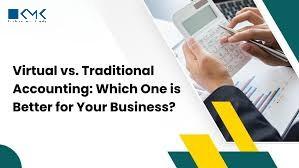Virtual Accountants vs Traditional CPAs: Pros and Cons for US SMEs

As digital transformation reshapes how small and medium-sized enterprises (SMEs) manage finances, the debate between virtual accountants and traditional CPAs has gained traction. Both offer valuable expertise—but which one is the better fit for your business in 2025? Let’s explore how each approach compares in terms of flexibility, cost, communication, and efficiency.
The Changing Face of Accounting in the Digital Era
Gone are the days when accounting meant stacks of paper, spreadsheets, and in-person meetings. Today’s US SMEs are adopting cloud-based platforms, real-time dashboards, and automation tools that streamline bookkeeping and financial reporting.
This shift has led to the rise of the virtual accountant for small business—a modern solution that allows entrepreneurs to access professional financial expertise remotely while maintaining full visibility and control over their books.
What Is a Virtual Accountant?
A virtual accountant works remotely, using secure cloud software to handle bookkeeping, payroll, tax filing, and financial reporting. Instead of hiring a full-time in-house accountant, businesses can outsource these services to professionals who operate online.
This model is especially popular among startups and growing companies that need reliable accounting support without the overhead of hiring a local CPA or maintaining office space.
What Does a Traditional CPA Offer?
Traditional Certified Public Accountants (CPAs) typically provide on-site, face-to-face financial services. They are ideal for businesses that prefer in-person consultations, require complex tax planning, or operate in regulated industries.
While many traditional CPAs now use digital tools, their service model often involves higher fees and less flexibility compared to virtual accounting options.
Pros of Hiring a Virtual Accountant
-
Cost Efficiency – Virtual accountants are generally more affordable. You pay for the services you need—no salaries, office expenses, or employee benefits.
-
Flexibility and Scalability – As your business grows, you can scale services up or down easily.
-
24/7 Access – Online dashboards and secure portals give you real-time access to financial data anytime, anywhere.
-
Specialized Expertise – Many virtual accountants specialize in industries such as e-commerce, SaaS, or professional services, providing tailored financial insights.
-
Integration with Technology – They use tools like QuickBooks Online, Xero, and FreshBooks, integrating seamlessly with your existing systems.
Cons of Virtual Accountants
-
Less Face-to-Face Interaction – While video calls and chat platforms help bridge the gap, some business owners still prefer in-person discussions.
-
Dependence on Technology – A stable internet connection and familiarity with digital tools are essential.
-
Quality Varies by Provider – As the market grows, the skill level of virtual accountants can differ, so vetting the provider is crucial.
Pros of Traditional CPAs
-
Personalized Local Support – Ideal for business owners who value direct communication and long-term relationships.
-
In-Depth Regulatory Knowledge – CPAs often have strong insights into local tax laws and compliance requirements.
-
Ideal for Complex Tax Needs – Businesses with multi-state operations or advanced financial strategies may benefit from in-person CPA expertise.
Cons of Traditional CPAs
-
Higher Cost Structure – Full-time or local CPAs typically charge more due to office overhead and professional licensing costs.
-
Limited Flexibility – Fixed schedules and in-person requirements can slow down processes.
-
Less Real-Time Insight – Manual reporting and slower data processing may delay decision-making.
How US SMEs Are Choosing Between the Two
In 2025, the choice largely depends on your business model and priorities.
-
Tech-savvy and growth-focused companies often opt for virtual accountants due to their flexibility, affordability, and automation benefits.
-
Established firms with complex tax strategies may still prefer traditional CPAs for their personalized attention and local expertise.
Many growing SMEs now combine both models—using virtual accountants for day-to-day operations and consulting CPAs for audits or strategic planning.
The Role of Cloud Accounting and AI
Modern virtual accountants leverage automation and artificial intelligence to manage repetitive tasks like invoice matching, bank reconciliation, and reporting. This not only improves accuracy but also frees up time for strategic financial insights.
Traditional CPAs are also embracing technology but may take longer to fully transition due to legacy systems and on-site requirements.
Making the Right Choice for Your Business
Before choosing between a virtual accountant or a traditional CPA, consider:
-
Your budget and business size
-
The complexity of your accounting and tax requirements
-
Your comfort with digital tools
-
The level of real-time visibility you need
A virtual accountant for small business can be the smarter choice for firms aiming to stay agile, cost-effective, and digitally advanced in 2025.
Conclusion
As US SMEs continue to evolve in a fast-paced, digital-first economy, accounting strategies must adapt accordingly. Virtual accountants offer unmatched flexibility and real-time control, while traditional CPAs provide the trust and local expertise many businesses still value.
For most modern small businesses, embracing a hybrid approach—leveraging the strengths of both models—ensures the best of both worlds: innovation and reliability.
- AI
- Vitamins
- Health
- Admin/office jobs
- News
- Art
- Causes
- Crafts
- Dance
- Drinks
- Film
- Fitness
- Food
- Giochi
- Gardening
- Health
- Home
- Literature
- Music
- Networking
- Altre informazioni
- Party
- Religion
- Shopping
- Sports
- Theater
- Wellness


